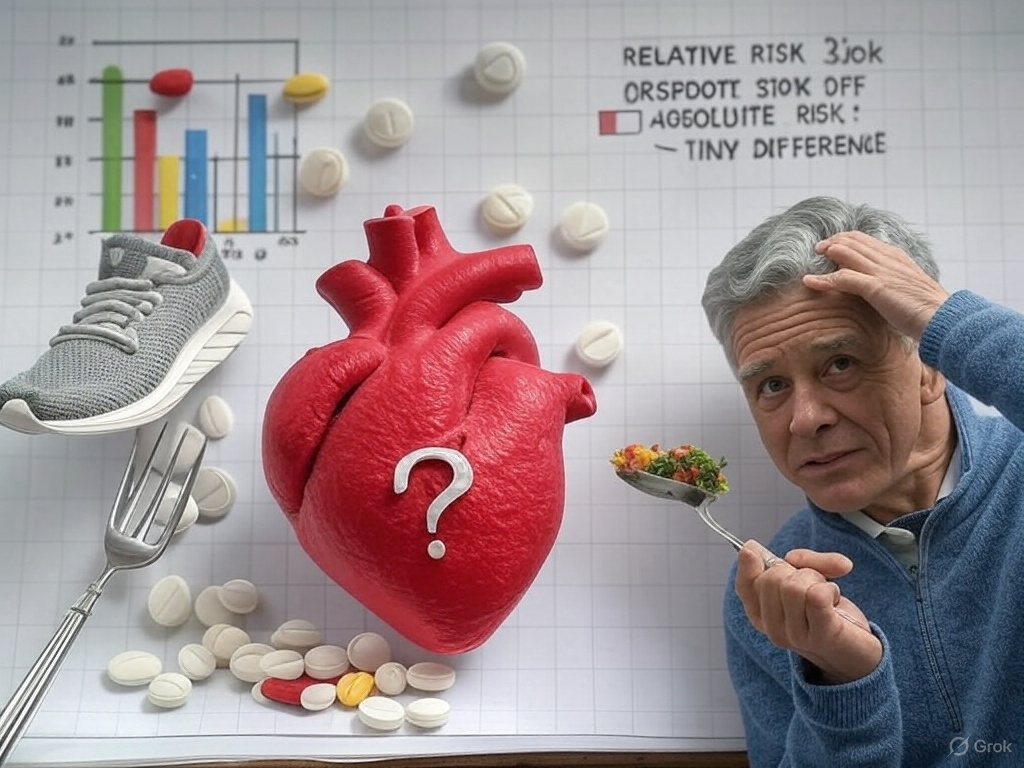
Hey America, let’s chat about statins—those cholesterol-lowering pills your doctor might’ve pushed on you. You’ve probably heard they’re a miracle for your heart, slashing your risk of heart attacks and strokes. But hold up—there’s a catch with the numbers they throw around, and some folks say statins might not be the superhero they’re cracked up to be. Let’s unpack this with a dose of real talk about “relative risk” and why it might not mean as much as you think.
Relative Risk: Sounds Big, But What’s It Really?
When studies say statins cut your heart attack risk by 30% or your chance of dying from heart issues by 14%, that’s relative risk. Sounds impressive, right? It’s like saying you’ve got a 30% off coupon—pretty sweet deal! But here’s the kicker: that percentage is relative to your starting risk, which might be tiny to begin with.
Let’s say your chance of a heart attack without statins is 2% over 10 years (that’s 2 out of 100 people like you). A 30% relative risk reduction drops that to 1.4% (1.4 out of 100). So, yeah, it’s lower—but it’s not like you went from 50% to 20%. The absolute difference? Just 0.6%. That means for every 167 people taking statins, only one avoids a heart attack. The other 166? They’re popping pills for… well, maybe not much.
The Statin Hype vs. Reality
Big studies—like one from The Lancet in 2016—love touting these relative risk wins. They looked at tons of people and said statins lower heart attack odds by about a third for folks at risk. Drug companies and some doctors ran with it, making statins sound like a must-have. But critics say: “Wait a sec—look at the absolute numbers.” If your risk was low to start—like under 5% over a decade—that 30% relative drop might only shave off a fraction of a percent. For a lot of people, that’s not a game-changer; it’s a shrug.
Who’s Really Winning Here?
Here’s where it gets dicey. Statins shine most for people who’ve already had a heart attack (that’s called “secondary prevention”). Their starting risk is higher—say, 20%—so a 30% reduction means something real, like dropping to 14%. But for the rest of us? The “primary prevention” crowd—folks with high cholesterol or some risk factors but no heart history—the benefit shrinks. Studies show maybe 1 or 2 out of 100 avoid a heart event over years of pill-taking. That’s a lot of effort (and side effects) for a small payoff.
Side Effects and the Trade-Off
Speaking of side effects, statins aren’t freebies. Muscle pain hits about 10% of users, and some folks deal with fatigue, liver issues, or even a slight diabetes bump. If you’re one of the 99 out of 100 who wouldn’t have had a heart attack anyway, are those aches worth it for a maybe-benefit? Critics say no—they argue statins are overprescribed, especially for people with low absolute risk, and the drug industry’s hyping relative risk to keep sales humming.
The Numbers Don’t Lie—Or Do They?
Some docs and researchers—like those pushing back in journals or on X—say statins are “ineffective” for most because the absolute benefit is so puny. They point out that studies often cherry-pick relative risk to dazzle us, while burying the fact that 95%+ of users might see no difference. Plus, they argue lifestyle fixes—like cutting junk food or walking more—could match or beat that tiny absolute gain without a prescription.
What’s Your Move?
So, should you ditch your statins? Not so fast—that’s between you and your doc. If your risk is high (think 20%+ over 10 years), the absolute benefit might justify it. But if you’re in the low-risk club (under 5% or so), ask: “What’s my absolute risk reduction?” Don’t let a flashy 30% relative stat fool you—get the real number. And maybe eyeball your diet and sneakers too; they’re cheaper than pills.
The Bottom Line
As of March 7, 2025, the statin debate’s still hot. Relative risk makes them sound like heart-savers, but for lots of folks, the absolute impact’s more like a whisper than a shout. Critics say they’re overhyped and borderline ineffective for the average Joe or Jane with mild risks. So next time you refill that prescription, think: am I chasing a big relative win or a tiny absolute one? Your heart—and your wallet—might thank you for digging deeper.
Stay smart, y’all!





